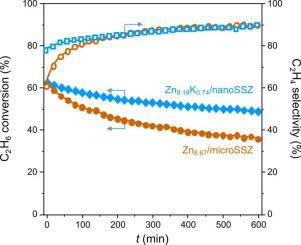Applied Catalysis B: Environment and Energy ( IF 22.1 ) Pub Date : 2021-11-22 , DOI: 10.1016/j.apcatb.2021.120947 Jiaxu Liu 1 , Zhenmei Zhang 1 , Yulin Jiang 1 , Xiao Jiang 2 , Ning He 1 , Siyang Yan 1 , Peng Guo 3 , Guang Xiong 1 , Ji Su 4 , Gianvito Vilé 5

|
Zeolites with incorporated Zn species are gaining relevance for catalyzing the dehydrogenation of short-chain alkanes. However, the presence of zinc also leads to the C-C cleavage in the alkane, lowering the selectivity to the olefin. We disclose herein the importance of controlling the zeolite particle size and the promoting role of K2O addition to improve the alkene selectivity and catalyst stability during Zn-catalyzed CO2-assisted oxidative dehydrogenation of ethane. In particular, the nano-sized SSZ-13 catalysts outperform the micro-sized SSZ-13 catalysts in terms of C2H6 conversion due to the critical role of zeolite crystal surface properties that improves the dispersion of the Zn phase. The modification of Zn with K2O neutralizes the acidity of the catalysts, suppressing the formation of undesired paths and leading to higher C2H4 selectivity and improved stability. Detailed characterizations and density functional theory show that K2O-neighbored (Zn-O-Zn)2+ lowers the activation barrier for the surface removal of H-based adsorbates. Overall, these findings demonstrate the roles of fine-tuning acid-base properties on the zeolite surface to control the catalytic performance during the CO2-assisted conversion of light alkanes.
中文翻译:

沸石表面性质和钾改性对Zn催化CO2辅助乙烷氧化脱氢的影响
掺入 Zn 物质的沸石与催化短链烷烃的脱氢有关。然而,锌的存在也会导致烷烃中的 CC 裂解,从而降低对烯烃的选择性。我们在本文中公开了控制沸石粒度的重要性和K 2 O添加的促进作用以在Zn催化的CO 2辅助的乙烷氧化脱氢过程中改进烯烃选择性和催化剂稳定性。特别是,由于沸石晶体表面性质对改善 Zn 相分散的关键作用,纳米级 SSZ-13 催化剂在 C 2 H 6转化率方面优于微米级 SSZ-13 催化剂。K对Zn的改性2 O 中和了催化剂的酸性,抑制了不希望的路径的形成,并导致更高的 C 2 H 4选择性和改进的稳定性。详细的表征和密度泛函理论表明,K 2 O-neighbored (Zn-O-Zn) 2+降低了表面去除 H 基吸附物的活化势垒。总体而言,这些发现证明了微调沸石表面的酸碱性质在 CO 2辅助的轻质烷烃转化过程中控制催化性能的作用。



























 京公网安备 11010802027423号
京公网安备 11010802027423号